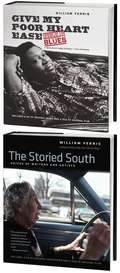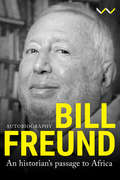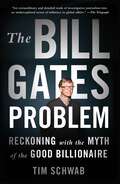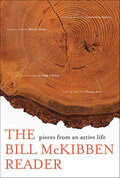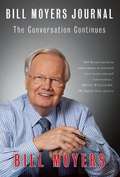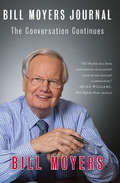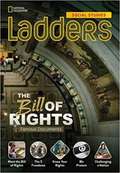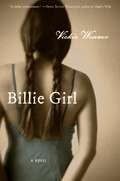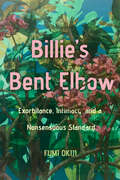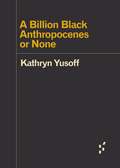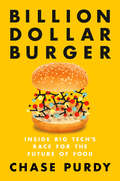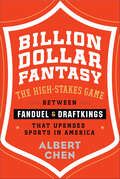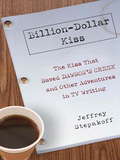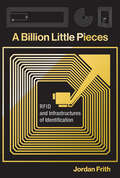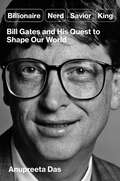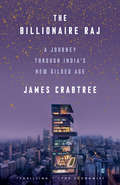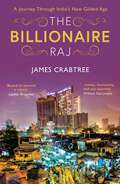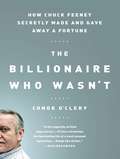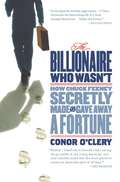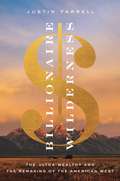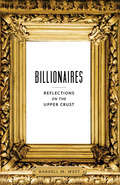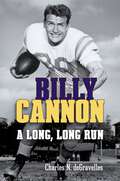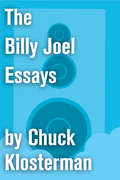- Table View
- List View
The Bill Ferris Enhanced Omnibus E-Book
by William FerrisThis Omnibus Ebook for the first time brings together pioneering folklorist William Ferris's books on the music and arts of the South.Included in this ebook are:Give My Poor Heart Ease: Voices of the Mississippi Blues:Throughout the 1960s and 1970s, Ferris toured his home state of Mississippi, documenting the voices of African Americans as they spoke about and performed the diverse musical traditions that form the authentic roots of the blues. Now, Give My Poor Heart Ease puts front and center a searing selection of the artistically and emotionally rich voices from this invaluable documentary record. Illustrated with Ferris's photographs of the musicians and their communities and including original music and original film, the book features more than twenty interviews relating frank, dramatic, and engaging narratives about black life and blues music in the heart of the American South.The enhanced ebook edition includes: * Almost 2 hours of video clips and interviews scattered throughout the text* An hour of original music, also imbedded throughout the text* Concludes with the full DVD of original film and full CD of original musicThe Storied South: Voices of Writers and Artists:The Storied South features the voices--by turn searching and honest, coy and scathing--of twenty-six of the most luminous artists and thinkers in the American cultural firmament, from Eudora Welty, Pete Seeger, and Alice Walker to William Eggleston, Bobby Rush, and C. Vann Woodward. Masterfully drawn from one-on-one interviews conducted by Ferris over the past forty years, the book reveals how storytelling is viscerally tied to southern identity and how the work of these southern or southern-inspired creators has shaped the way Americans think and talk about the South.The enhanced ebook edition includes 45 of Ferris's striking photographic portraits of the speakers and original audio and films of the interviews.
Bill Freund: An historian’s passage to Africa
by Bill FreundThe first biography of an eminent historian of South AfricaBill Freund, the late social historian and leading analyst of African history, passed away in 2020 soon after finishing his autobiography. Often described as the academy’s ‘outsider insider’, he was an eminent South African historian who published prodigiously in the areas of labour, capital and economic history. What influenced this American-educated academic to become such an astute and trusted observer of the political economy in Africa? We follow Bill’s intellectual journey from a modest Jewish home in Chicago in the 1950s to the Universities of Chicago, Yale, Ahmadu Bello University in Nigeria and Dar-es-Salaam, Tanzania, and finally to a permanent teaching position at the University of KwaZulu-Natal in Durban, South Africa. Peppered in between the commentaries on academic life are stories of his travels, poems he wrote for loved ones, and endearing anecdotes of friendships that shaped his life. As an ‘outsider’, both in the United States and abroad, he is able to offer rich insights into the world of Africanists and their scholarship on different continents. His thoughtful and balanced observations on late- and post-apartheid South Africa are especially interesting and refreshing. This posthumously published autobiography will give deeper insight into this unusual man and the world that shaped him – and which he in turn influenced through a deep commitment to rigorous scholarship. It includes a select bibliography of Bill Freund’s many publications as well as a foreword by Robert Morrell on the making of this autobiography.
The Bill Gates Problem: Reckoning with the Myth of the Good Billionaire
by Tim SchwabNew York Times Editors' ChoiceA powerful investigation of Bill Gates and the Gates Foundation, showing how he uses philanthropy to exercise enormous political power without accountabilityThrough his vaunted philanthropy, Bill Gates transformed himself from a tech villain into one of the most admired people on the planet. Even as divorce proceedings and allegations of misconduct have recently tarnished his public image, the beneficence of the Gates Foundation, celebrated for spending billions to save lives around the globe, is taken as a given. But as Tim Schwab shows in this fearless investigation, Gates is still exactly who he was at Microsoft: a bully and monopolist, convinced of his own righteousness and intent on imposing his ideas, his solutions, and his leadership on everyone else. At the core, he is not a selfless philanthropist but a power broker, a clever engineer who has innovated a way to turn extreme wealth into immense political influence—and who has made us believe we should applaud his acquisition of power, not challenge it. Piercing the blinding halo that has for too long shielded the world’s most powerful (and most secretive) charitable organization from public scrutiny, The Bill Gates Problem shows how Gates’s billions have purchased a stunning level of control over public policy, private markets, scientific research, and the news media. Whether he is pushing new educational standards in America, health reforms in India, global vaccine policy during the pandemic, or Western industrialized agriculture throughout Africa, Gates’s heady social experimentation has shown itself to be not only undemocratic, but also ineffective. In many places, Bill Gates is hurting the very people he intends to help. No less than dark-money campaign contributions or big-business political lobbying, Bill Gates’s philanthropic empire needs to be seen as a problem of money in politics. It is a dangerous model of unconstrained power that threatens democracy and demands our attention.
The Bill McKibben Reader: Pieces from an Active Life
by Bill McKibbenPowerful, impassioned essays on living and being in the world, from the bestselling author of The End of Nature and Deep EconomyFor a generation, Bill McKibben has been among America's most impassioned and beloved writers on our relationship to our world and our environment. His groundbreaking book on climate change, The End of Nature, is considered "as important as Rachel Carson's classic Silent Spring"* and Deep Economy, his "deeply thoughtful and mind-expanding"** exploration of globalization, helped awaken and fuel a movement to restore local economies.Now, for the first time, the best of McKibben's essays—fiery, magical, and infused with his uniquely soulful investigations of modern life—are collected in a single volume, The Bill McKibben Reader. Whether meditating on today's golden age in radio, the natural place of biting black flies in our lives, or the patriotism of a grandmother fighting to get corporate money out of politics, McKibben inspires us to become better caretakers of the Earth—and of one another.*The Plain Dealer (Cleveland )**Michael Pollan
Bill Moyers Journal: The Conversation Continues
by Bill MoyersOne of the most highly rated public affairs programmes on American television, Bill Moyers' Journal drew up to two million weekly viewers from 2007 to 2010. With incisive, morally engaging text, this stunning companion brings Moyers' groundbreaking work to the page. Featuring extensive new commentary from Bill Moyers, it is an unparalleled guide to the debates, the cultural currents and above all the fascinating people that have so powerfully shaped today's world.
Bill Moyers Journal: The Conversation Continues
by Bill MoyersA companion volume to the Emmy Award–winning PBS® series—interviews with &“an essential voice in our national conversation&” (Brian Williams, MSNBC anchor). This &“provocative&” and &“absorbing&” (Star Tribune) companion book to Bill Moyer&’s acclaimed PBS series invites readers into conversations with some of the most captivating voices on the scene today, in what Kirkus Reviews calls &“a glittering array of discussions.&” From Jon Stewart on politics and media to Michael Pollan on food, The Wire creator David Simon on the mean streets of our cities, James Cone and Shelby Steele on race in the age of Obama, Robert Bly and Nikki Giovanni on the power of poetry, Barbara Ehrenreich on the hard times of working Americans, and Karen Armstrong on faith and compassion, Moyer&’s own intelligence and insight match that of his guests and their discussions animate many of the most salient issues of our time. With extensive commentary from Moyers, marked by his customary &“respect, intelligence, curiosity, humor, and graciousness,&” here are the debates; cultural currents; and, above all, lively minds that shape the conversation of democracy (Booklist). &“In an era of much instant and ephemeral talk, it is a pleasurable thing to hold this &‘book of ideas.&’&” —Publishers Weekly &“[Moyers] has always been about something beyond the moment. Or put another way, while everyone else in the media has been exploring topography, Moyers has been exploring geology.&” —Los Angeles Times
The Bill of Rights: Famous Documents [On-Level] (Ladders Social Studies 5)
by Anne Goudvis Andrew MilsonNIMAC-sourced textbook <P><P>Articles for the National Geographic Famous Documents Series. Articles include The Five Freedoms, Know Your Rights and We Protest
Billie Girl
by Vickie Weaver"Honestly strange and strangely honest. . . . Remarkably compelling and powerful. Weaver's authenticity of characters, situations, and bygone eras emanates from sheer originality of style. This amazing novel is a stellar achievement-gritty, funny, fresh, and bold. It will make your eyes bug out and your pulse race. And how it shines, shines with humanity!"-Sena Jeter Naslund, author of Ahab's Wife"Southern Gothic to the core, suffused with a humor as dark as the bottom of a Georgia well. . . .Weaver has stepped forward for the benefit of anyone who reads American fiction."-Kirby Gann, author of Our Napoleon in Rags"Savagely funny, wildly ambitious. . . . A bawdy, brutal, and beautiful meditation on identity, sex, and mercy. Weaver has a fiercely distinctive vision."-K.L. Cook, author of The Girl from Charnelle"Darkly comic, deeply poignant. . . . Billie Girl is the adventurer through a long, strange trip that is life itself."-Roy Hoffman, author of Chicken Dreaming CornAbandoned as in infant because of her incessant crying, Billie Girl is raised by two women who are brothers. Her life, a gender-bending puzzle filled with dark humor, is a series of encounters with strangers who struggle along with what they are given: a bigamist husband, a long-lost daughter named after a car, a lesbian preacher's wife, a platonic second husband who loved her adoptive father. Twin themes of sexuality and euthanasia run throughout. In a journey from hard-dirt Georgia farm to end-of-life nursing home, Billie Girl comes to understand the mercy of killing.
Billie’s Bent Elbow: Exorbitance, Intimacy, and a Nonsensuous Standard
by Fumi OkijiDeeply informed by jazz, Billie's Bent Elbow explores the nonsensical and nonsensuous in black radical thought and expression. Extending the encounter between black study, Frankfurt School critical theory, and sound studies staged in her first book, Jazz as Critique, and, crucially, bringing Yoruba aesthetics into the conversation, Okiji attunes to various sites of intemperance and equivocation in thought and music. Billie's Bent Elbow eschews the parsimonious tendencies of the Western philosophical tradition, in its contribution to a shared project of improvised correspondence that finds its criticality in its heterophony of approach and intention. The book ranges from Haitian revolutionaries' rendition of "La Marseillaise," to Cecil Taylor's synesthetic poetics, to the aporetic mien of the orisha Esu, to Billie Holiday's undulating arm. What is more, by way of her intense fascination with these sites of fantastic noise, Okiji brings our attention to a galaxy of intimacies that flash up in her experiments in array and correspondence. The nonsensuous standard Okiji cultivates in this musical and essayistic book, in concert with a host of theorists, musicians and artists, is as much a statement of non-citizenry as it is preparation for intoxicated gathering.
A Billion Black Anthropocenes or None (Forerunners: Ideas First)
by Kathryn YusoffRewriting the &“origin stories&” of the Anthropocene No geology is neutral, writes Kathryn Yusoff. Tracing the color line of the Anthropocene, A Billion Black Anthropocenes or None examines how the grammar of geology is foundational to establishing the extractive economies of subjective life and the earth under colonialism and slavery. Yusoff initiates a transdisciplinary conversation between feminist black theory, geography, and the earth sciences, addressing the politics of the Anthropocene within the context of race, materiality, deep time, and the afterlives of geology. Forerunners is a thought-in-process series of breakthrough digital works. Written between fresh ideas and finished books, Forerunners draws on scholarly work initiated in notable blogs, social media, conference plenaries, journal articles, and the synergy of academic exchange. This is gray literature publishing: where intense thinking, change, and speculation take place in scholarship.
Billion Dollar Burger: Inside Big Tech's Race for the Future of Food
by Chase PurdyThe riveting story of the entrepreneurs and renegades fighting to bring lab-grown meat to the world.The trillion-dollar meat industry is one of our greatest environmental hazards; it pollutes more than all the world's fossil-fuel-powered cars. Global animal agriculture is responsible for deforestation, soil erosion, and more emissions than air travel, paper mills, and coal mining combined. It also, of course, depends on the slaughter of more than 60 billion animals per year, a number that is only increasing as the global appetite for meat swells. But a band of doctors, scientists, activists, and entrepreneurs have been racing to end animal agriculture as we know it, hoping to fulfill a dream of creating meat without ever having to kill an animal. In the laboratories of Silicon Valley companies, Dutch universities, and Israeli startups, visionaries are growing burgers and steaks from microscopic animal cells and inventing systems to do so at scale--allowing us to feed the world without slaughter and environmental devastation. Drawing from exclusive and unprecedented access to the main players, from polarizing activist-turned-tech CEO Josh Tetrick to lobbyists and regulators on both sides of the issue, Billion Dollar Burger follows the people fighting to upend our food system as they butt up against the entrenched interests fighting viciously to stop them. The stakes are monumentally high: cell-cultured meat is the best hope for sustainable food production, a key to fighting climate change, a gold mine for the companies that make it happen, and an existential threat for the farmers and meatpackers that make our meat today. Are we ready?
Billion Dollar Fantasy: The High-Stakes Game Between FanDuel and DraftKings that Upended Sports in America
by Albert ChenBillion Dollar Fantasy has descriptive copy which is not yet available from the Publisher.
Billion-Dollar Kiss
by Jeffrey StepakoffNow in paperback, the riveting behind-the-scenes look at how television shows are really created, from a successful writer-producerWhen Jeffrey Stepakoff was graduating with an MFA in playwriting, he imagined a life in theater. Writing for TV didn't even cross his mind. But he ended up in L. A. in the late eighties, when television writers were experiencing a gold rush. After the billion-dollar syndication of Seinfeld, the mania for scripted entertainment made the TV writer a hot commodity. Weaving his personal narrative with a history of television, Stepakoff shows what it's like to have a story idea one week and then have it seen by millions a week later. He also takes us inside the industry to explore the problems of media consolidation, interference by executives, lack of diversity, and what reality television is doing to quality scripted television.
A Billion Little Pieces: RFID and Infrastructures of Identification (Infrastructures)
by Jordan FrithHow RFID, a ubiquitous but often invisible mobile technology, identifies tens of billions of objects as they move through the world.RFID (Radio Frequency Identification) is ubiquitous but often invisible, a mobile technology used by more people more often than any flashy smartphone app. RFID systems use radio waves to communicate identifying information, transmitting data from a tag that carries data to a reader that accesses the data. RFID tags can be found in credit cards, passports, key fobs, car windshields, subway passes, consumer electronics, tunnel walls, and even human and animal bodies—identifying tens of billions of objects as they move through the world. In this book, Jordan Frith looks at RFID technology and its social impact, bringing into focus a technology that was designed not to be noticed.RFID, with its ability to collect unique information about almost any material object, has been hyped as the most important identification technology since the bar code, the linchpin of the Internet of Things—and also seen (by some evangelical Christians) as a harbinger of the end times. Frith views RFID as an infrastructure of identification that simultaneously functions as an infrastructure of communication. He uses RFID to examine such larger issues as big data, privacy, and surveillance, giving specificity to debates about societal trends. Frith describes how RFID can monitor hand washing in hospitals, change supply chain logistics, communicate wine vintages, and identify rescued pets. He offers an accessible explanation of the technology, looks at privacy concerns, and pushes back against alarmist accounts that exaggerate RFID's capabilities. The increasingly granular practices of identification enabled by RFID and other identification technologies, Frith argues, have become essential to the working of contemporary networks, reshaping the ways we use information.
Billionaire, Nerd, Savior, King: Bill Gates and His Quest to Shape Our World
by Anupreeta DasFrom the finance editor of The New York Times, an examination of Bill Gates—one of the most powerful, fascinating, and contradictory figures of the past four decades—and an eye-opening exploration of our national fixation on billionaires.Few billionaires have been in the public eye for as long, and in as many guises, as Bill Gates. At first heralded as a tech visionary, the Microsoft cofounder next morphed into a ruthless capitalist, only to change yet again when he fashioned himself into a global do-gooder. Along the way, Gates forever influenced how we think about tech founders, as the products they make and the ideas they sell continue to dominate our lives. Through the Bill & Melinda Gates Foundation, he also set a new standard for high-profile, billionaire philanthropy. But there is more to Gates&’s story, and here, Das&’s revelatory reporting shows us that billionaires have secrets and philanthropy can have a dark side. Drawing upon hundreds of interviews with current and former employees of the Gates Foundation, Microsoft, academics, nonprofits, and those with insight into the Gates universe, Das delves into Gates&’s relationships with Warren Buffett, Jeffrey Epstein, Melinda French Gates, and others, to uncover the truths behind the public persona. In telling Gates&’s story, Das also provides a new way to think about how billionaires wield their power, manipulate their image, and pursue philanthropy to become heroes, repair damaged reputations, and direct policy to achieve their preferred outcomes. Insightful, illuminating, and timely, Billionaire, Nerd, Savior, King is an important story of money and government, wealth and power, and media and image, and the ways in which the world&’s richest people hold us in their thrall.
The Billionaire Raj: A Journey Through India's New Gilded Age
by James CrabtreeA colorful and revealing portrait of the rise of India’s new billionaire class in a radically unequal society India is the world’s largest democracy, with more than one billion people and an economy expanding faster than China’s. But the rewards of this growth have been far from evenly shared, and the country’s top 1% now own nearly 60% of its wealth. In megacities like Mumbai, where half the population live in slums, the extraordinary riches of India’s new dynasties echo the Vanderbilts and Rockefellers of yesterday, funneling profits from huge conglomerates into lifestyles of conspicuous consumption. James Crabtree’s The Billionaire Raj takes readers on a personal journey to meet these reclusive billionaires, fugitive tycoons, and shadowy political power brokers. From the sky terrace of the world’s most expensive home to impoverished villages and mass political rallies, Crabtree dramatizes the battle between crony capitalists and economic reformers, revealing a tense struggle between equality and privilege playing out against a combustible backdrop of aspiration, class, and caste. The Billionaire Raj is a vivid account of a divided society on the cusp of transformation—and a struggle that will shape not just India’s future, but the world’s.
Billionaire Raj: SHORTLISTED FOR THE FT & MCKINSEY BUSINESS BOOK OF THE YEAR AWARD 2018
by James CrabtreeSHORTLISTED FOR THE FT & MCKINSEY BUSINESS BOOK OF THE YEAR AWARD 2018 A Financial Times Book of the Year and an Amazon Top 100 Book of the Year India&’s explosive rise has driven inequality to new extremes, with millions trapped in slums as billionaires spend lavishly and dodge taxes. Controversial prime minister Narendra Modi promised &‘to break the grip&’ of the Bollygarchs, but many tycoons continue to thrive amidst the scandals, exerting huge influence over business and politics. But who are these titans of politics and industry shaping India through this period of breakneck change? And what kind of superpower are they creating? A vivid portrait of a deeply divided nation, The Billionaire Raj makes clear that India&’s destiny – prosperous democratic giant or corrupt authoritarian regime – is something that should concern us all.
The Billionaire Who Wasn't: How Chuck Feeney Secretly Made and Gave Away a Fortune
by Conor O'CleryChuck Feeney was born in Elizabeth, New Jersey, to a blue-collar Irish-American family during the Depression. After service in the Korean War, he made a fortune as founder of Duty Free Shoppers, the world's largest duty-free retail chain. By 1988, he was hailed by Forbes Magazine as the twenty-fourth richest American alive. But secretly Feeney had already transferred all his wealth to his foundation, Atlantic Philanthropies. Only in 1997 when he sold his duty free interests, was he "outed" as one of the greatest and most mysterious American philanthropists in modern times. After going "underground" again, he emerged in 2005 to cooperate on a biography promoting giving while living. Now in his mid-seventies, Feeney is determined his foundation should spend down the remaining $4 billion in his lifetime.
The Billionaire Who Wasn't: How Chuck Feeney Secretly Made and Gave Away a Fortune
by Conor O'CleryChuck Feeney was born in Elizabeth, New Jersey, to a blue-collar Irish-American family during the Depression. After service in the Korean War, he made a fortune as founder of Duty Free Shoppers, the world’s largest duty-free retail chain. By 1988, he was hailed by Forbes Magazine as the twenty-fourth richest American alive. But secretly Feeney had already transferred all his wealth to his foundation, Atlantic Philanthropies. Only in 1997 when he sold his duty free interests, was he “outed” as one of the greatest and most mysterious American philanthropists in modern times. After going “underground” again, he emerged in 2005 to cooperate on a biography promoting giving while living. Now in his mid-seventies, Feeney is determined his foundation should spend down the remaining $4 billion in his lifetime.
The Billionaire Who Wasn't
by Conor O'CleryChuck Feeney was born in Elizabeth, New Jersey, to a blue-collar Irish-American family during the Depression. After service in the Korean War, he made a fortune as founder of Duty Free Shoppers, the world's largest duty-free retail chain. By 1988, he was hailed by Forbes Magazine as the twenty-fourth richest American alive. But secretly Feeney had already transferred all his wealth to his foundation, Atlantic Philanthropies. Only in 1997 when he sold his duty free interests, was he "outed" as one of the greatest and most mysterious American philanthropists in modern times. After going "underground" again, he emerged in 2005 to cooperate on a biography promoting giving while living. Now in his mid-seventies, Feeney is determined his foundation should spend down the remaining $4 billion in his lifetime.
Billionaire Wilderness: The Ultra-Wealthy and the Remaking of the American West (Princeton Studies in Cultural Sociology #83)
by Justin FarrellA revealing look at the intersection of wealth, philanthropy, and conservationBillionaire Wilderness takes you inside the exclusive world of the ultra-wealthy, showing how today's richest people are using the natural environment to solve the existential dilemmas they face. Justin Farrell spent five years in Teton County, Wyoming, the richest county in the United States, and a community where income inequality is the worst in the nation. He conducted hundreds of in-depth interviews, gaining unprecedented access to tech CEOs, Wall Street financiers, oil magnates, and other prominent figures in business and politics. He also talked with the rural poor who live among the ultra-wealthy and often work for them. The result is a penetrating account of the far-reaching consequences of the massive accrual of wealth, and an eye-opening and sometimes troubling portrait of a changing American West where romanticizing rural poverty and conserving nature can be lucrative—socially as well as financially.Weaving unforgettable storytelling with thought-provoking analysis, Billionaire Wilderness reveals how the ultra-wealthy are buying up the land and leveraging one of the most pristine ecosystems in the world to climb even higher on the socioeconomic ladder. The affluent of Teton County are people burdened by stigmas, guilt, and status anxiety—and they appropriate nature and rural people to create more virtuous and deserving versions of themselves. Incisive and compelling, Billionaire Wilderness reveals the hidden connections between wealth concentration and the environment, two of the most pressing and contentious issues of our time.
Billionaires
by Darrell M. WestMeet the Billionaires: the 1,645 men and women who control a massive share of global assets worth $6.5 trillion. Darrell West reveals what the other 99.99998% of us need to know.With rich anecdotes and personal narratives, West goes inside the world of the ultra wealthy. Meet U.S. billionaires such as Sheldon Adelson, Michael Bloomberg, David and Charles Koch, George Soros, Tom Steyer, and Donald Trump-as well as international billionaires from around the globe.The growing political engagement of this small supra-wealthy group raises important questions about influence, transparency, and government performance, and West lays bare the wealthification of politics, including: How billionaires can block appointments and legislation they don't like Why the supra-wealthy moved into policy advocacy and referenda at the state level Why billionaires run for office in more than a dozen countries around the world
Billionaires
by Darrell M. WestMeet the Billionaires: the 1,645 men and women who control a massive share of global assets worth $6.5 trillion. Darrell West reveals what the other 99.99998% of us need to know.With rich anecdotes and personal narratives, West goes inside the world of the ultra wealthy. Meet U.S. billionaires such as Sheldon Adelson, Michael Bloomberg, David and Charles Koch, George Soros, Tom Steyer, and Donald Trump--as well as international billionaires from around the globe.The growing political engagement of this small supra-wealthy group raises important questions about influence, transparency, and government performance, and West lays bare the wealthification of politics, including:* How billionaires can block appointments and legislation they don't like* Why the supra-wealthy moved into policy advocacy and referenda at the state level* Why billionaires run for office in more than a dozen countries around the worldraine. From oligarchs in Russia and Eastern Europe to princelings in China, tycoons raise important questions about political influence, transparency, accountability, and government performance. This book argues that countries need policies that promote better transparency, governance, and opportunity.
Billy Cannon: A Long, Long Run
by Charles N. DeGravellesBilly Cannon’s name, his image, and his remarkable athletic career serve as emblems for Louisiana State University, the Southeastern Conference, and college football. LSU’s only Heisman Trophy winner, Cannon led the Tigers to a national championship in 1958, igniting a love of the game in Louisiana and establishing a tradition of greatness at LSU.But like many stories of lionized athletes who rise to the status of legend, there was a fall—and in the case of Billy Cannon, also redemption. For the first time, Charles N. deGravelles reveals in full the thrilling highs and unexpected lows of Cannon’s life, in Billy Cannon: A Long, Long Run.Through conversations with Cannon, deGravelles follows the athlete-turned-reformer from his boyhood in a working-class Baton Rouge neighborhood to his sudden rush of fame as the leading high school running back in the country. Personal and previously unpublished stories about Cannon’s glory days at LSU and his stellar but controversial career in the pros, as well as details of his indictment for counterfeiting and his post-release work as staff dentist at Louisiana State Penitentiary at Angola, unfold in a riveting biography characterized by uncanny success, deep internal struggles, and a champion’s spirit that pushed through it all.
The Billy Joel Essays
by Chuck KlostermanOriginally collected in Sex, Drugs, and Cocoa Puffs and Chuck Klosterman IV, and now available both as a stand-alone essay and in the ebook collection Chuck Klosterman on Pop, these essays are about Billy Joel.
